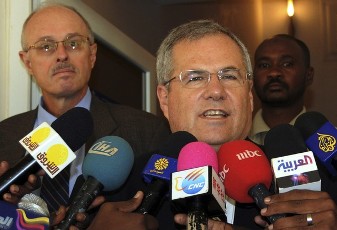Ex-US envoy says Sudan participation in world events “very difficult” due to Bashir indictment
October 13, 2012 (KHARTOUM) – The former US envoy to Sudan, Scott Gration, said on Saturday that it is “very difficult” for Sudan to fully participate in international political forums due to the fact that the country’s president Omer Al-Bashir is wanted by the International Criminal Court (ICC).

Since the ICC issued its first arrest warrant for Al-Bashir in 2008, the Sudanese leader has been able to travel to few Arab, African and Asian countries, including China, but he has not set foot in any Western country and has encountered several embarrassing situations where some host countries had to relocate events to avoid receiving him while others quietly asked that he cancels appearances at their events.
In an interview broadcast on Friday by Kenya’s private TV station NTV, Gration said that Al-Bashir’s indictment has made it “very difficult” for Sudan to participate fully in international political fora. The US official made his comment while comparing Sudan’s situation to Kenya which also has four of its top politicians indicted by the ICC in relation to the post-election violence that hit the country in late 2007.
Gration, who served as a US special envoy to Sudan between December 2010 and March 2011, also said that his country strongly supports efforts by the ICC to bring suspected perpetrators of crimes to trial.
Sudan refuses to cooperate with the court which is also seeking the arrest of three other Sudanese individuals, including the defense minister Abdel Rahim Mohammed Hussain and the governor of South Kordofan State Ahmad Haroun, on similar charges.
In an interview with the London-based newspaper Al-Sharq al-Awsat on Satruday, Sudan investment minister Mustafa Osman Ismail acknowledged that the arrest warrants have led to some “negative results” but downplayed their effect on Al-Bashir’s international travel.
The minister argued that Al-Bashir did not travel much even before the ICC arrest warrant and therefore it made no difference. He added that the president visited and continues to visit many Arab, African and Asian countries.
According to Ismail, many people in Sudan believe that the ICC charges are “concocted”. He went on to cite the fact that some members of the UN Security Council, including the US, are not members of the court as evidence that the ICC is a politicized entity.
(ST)
